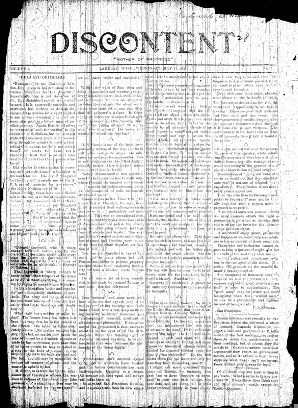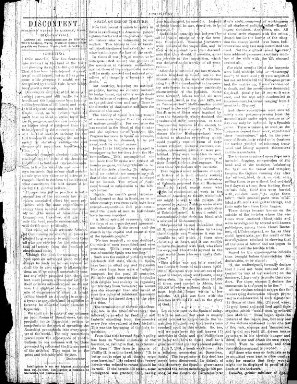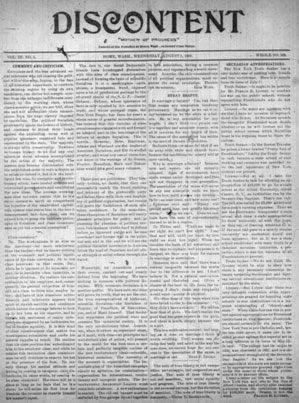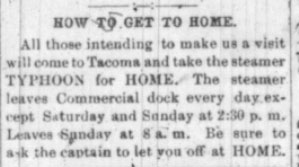Discontent:
Mother of Progress
|
Report by Amanda Rankin Abstract: Discontent: Mother of Progress was the second in a sequence of publications edited by members of the anarchist colony at Home, Washington, near Tacoma. Editor: Olivar A. Verity Address: LakeBay, Wash. Prior to 1901; Home, Pierce County, WA. After1901 Collection: University of Washington Library Microfilm [A3665]. Status: incomplete * * * * "If you want to know as the beliefs we try to place before the world cannot all, or nearly all be condensed in one issue of this publication. We request that those into whose hands a copy of Discontent may fall, and who wish further to enlightenment on or aims. Send us any inquiries on these subjects, and we will, from week to week, try to satisfy all real desire for information so far as our power will permit." Discontent June 8th, 1898 Discontent; Mother of Progress (1898-1902) was a four page Anarchist newspaper that was published weekly in LakeBay Washington at a yearly subscription price of 50 cent. LakeBay was the postal address of the famous "Home" anarchist colony that had been establish in 1896.. The editor of the paper was Olivar A. Verity, who usually signed himself O. A. Verity. Discontent contains local information about Home (officially called Mutual Home) as well as national news and articles selected from other newspapers. It was not published by the association or solely in the interest of the association. It was published by a group of Home residents who were interested in making it an organ for the spreading of the principles of liberty. Their goal was to send the truth, as they saw it, into as many homes as possible. The tone of the paper was not militant and angry but more straightforward and sarcastic. "Viewing themselves as peaceably disposed and kind-hearted people who were trying to elevate the conditions of humanity by persistently and earnestly teaching the masses. How to rise to a more complete civilization without war, starvation and unnecessary suffering of any kind. Anarchists, who want nothing unjustly and would harm no one intentionally, wishing everybody as well as themselves to have full liberty and equality without fear, force or favor." (August 17, 1898) Discontent is an abundant source of information about life in the anarchist community. Local news is found in each issue under the caption: Association Notes (renamed Home News after June of 1901). You can also read the Articles of Incorporation and Agreement of the Mutual Home, find out where meetings were located, identify distributors and agents for the paper, and read the advertisements that ran in the paper. Association Notes: Here is where you will find local news regarding the anarchist settlement. The information is this section varies from when the next singing school meeting will be held to who’s who at the Mutual Home. Here you can also find information about the cost of land, the number of people living at the Mutual Home at different times throughout the life of the paper, what the weather conditions were like, as well as the limitations of the association. The association was simply a land-holding institution, and couldn’t take any part in the starting of an industry. All industries were inaugurated by the members interested and those willing to help them. The only industry that was established during the publication of the Discontent was the cutting of cordwood. "Those thinking of coming here must expect to work, as it is not an easy task to clear this land and get it in condition for cultivation." It took about 50-100 day’s labor to clear an acre. The December 14, 1898 edition of Discontent notes " there were 51 colonists living at Home City and there were 15 homes. A 14x16 house made of rough board stood up and down could be purchased for the price of $20. The association twenty-seven and a half acres deeded and 64 acres under contract to be deeded when paid for by incoming members, and 120 acres tax titles, but not yet deeded." In the May 22, 1901 " there were 80 people living at Home City; 23 men, 22 women and 36 children-girls over 15 year 4, and boys 3." In the March 23, 1902 "there were 94 colonists living at Home City; 28 men, 25 women, and 41 children-girls over 15 years 4, and boys 5." For those trying to find out information on the growth of the Mutual home and everyday activities this is an excellent resource. Articles of Incorporation and Agreement of the Mutual Home Association:Early issues of Discontent printed the Articles of Incorporation which outlined the purpose of the association, the location of the Mutual Home, how and who can become a member, how affairs of the association are handled, and what happens to one’s property upon his or her death. *Purpose: to assist its members in obtaining and building homes for themselves and to aid in establishing better social and moral conditions. *Location: Von Geldern Cove (known locally as Joes Bay), Pierce County State of Washington an arm of Carrs Inlet, and 13 miles west from Tacoma on an air line, but the steamer route is about 20 miles. Parties intending to visit us will come to Tacoma and take the steamer ALICE for Joes Bay. The steamer leaves Commercial dock every Monday, Wednesday, and Friday at 8 a.m. Be sure to ask the caption to let you off at Jose Bay. *Membership: Any person may become a member. By paying into the treasury the sum equal to the cost of the land he or she may select and one dollar for a certificate and subscribing to the agreement. A certificate of membership is then issued giving him or her exclusive right to use and occupy any acre of land he or she may choose, just as long as taxes on the tract were kept up. *Affairs of the Association: Are conducted by a board of trustee elected as may be provided by law. June 18, 1899 the following were elected by acclamation: President, E. C. Miles
Anarchist Activities: Discontent is also rich with information about anarchist activities and meetings both in the Puget Sound region as well as around the country. Items like the following: "Wendell Phillips Education Club meets every Saturday at 8 p.m. at 31 Robinson, Providence, RI Pamphlets in English, German, French, Jewish and Russian languages on hand." Discontent seems to have had a wide circulation. It claimed distribution in two places in Boston-Columbia, and one place in San Francisco. Agents were located in Seattle, San Francisco, and Honolulu. Obscenity trial: Discontent followed in detail the arrest and obscenity trial of Charles C. Moore who was the editor of the Blue Grass Blade: Lexington, KY. Moore was arrested and charged with sending obscene matters through the mail and was convicted and sentenced to two years in the penitentiary. Discontent ran notices asking for contributions for his legal aid as well as information regarding Moore’s trial, conviction, and eventual acquittal after more than a year in prison. Discontent felt that Moore’s arrest and conviction "threaten the right of every citizen, and we band together to preserve the rights of free thought, free speech, free press, and free mails as guaranteed by the constitution of the United States." (June 20, 1900) Vol. I March 1, 1899 No. 43; Editor Moore Convicted (Charles C. Moore of the Blue Grass Blade: Lexington, KY) Vol. I March 8, 1899 No. 44; Help C.C. Moore Vol. II No. 50 June 20, 1900 Whole No. 102; Proclamation Vol. III No. 14 October 31, 1900 Whole No. 118; C.C. Moore Acquitted Vol. III No. 46 July 24, 1901 Whole No. 150 (Page 2 C.C. Moore)
|
Click to enlarge Local and National News The paper featured articles about both national news and local news--usually on the same page. What is Home? Home was a community of anarchists, dedicated to communal living.
Issues Not surprisingly, the writers of Discontent took radical stands on most issues. Here, authors compare the treatment of workers in capitalism to slavery. |
|
Copyright (c) 2001 by Amanda Rankin |
|








